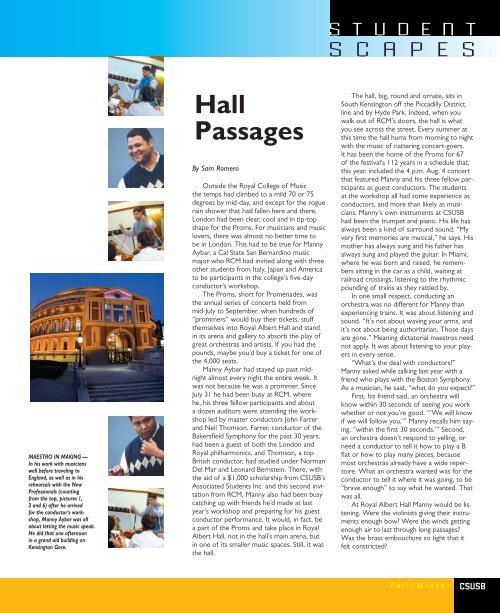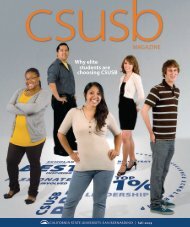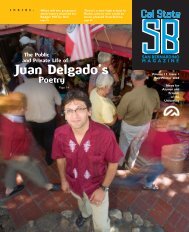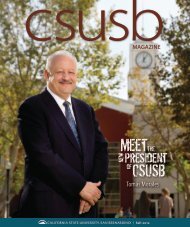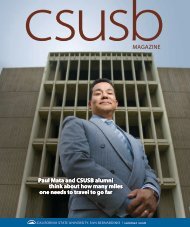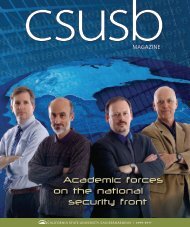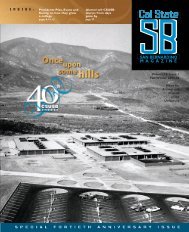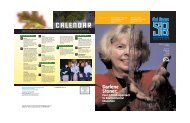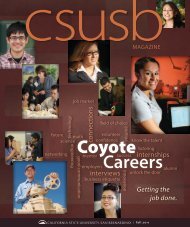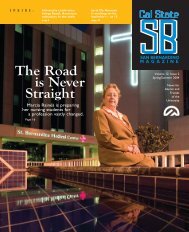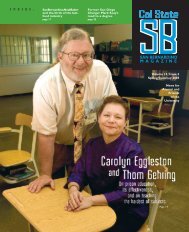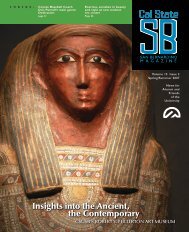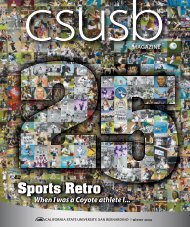The Rigors and Rewards of Being a Teacher - CSUSB Magazine ...
The Rigors and Rewards of Being a Teacher - CSUSB Magazine ...
The Rigors and Rewards of Being a Teacher - CSUSB Magazine ...
You also want an ePaper? Increase the reach of your titles
YUMPU automatically turns print PDFs into web optimized ePapers that Google loves.
S t u d e n t<br />
S c a p e s<br />
MAESTRO IN MAKING —<br />
In his work with musicians<br />
well before traveling to<br />
Engl<strong>and</strong>, as well as in his<br />
rehearsals with the New<br />
Pr<strong>of</strong>essionals (counting<br />
from the top, pictures 1,<br />
3 <strong>and</strong> 6) after he arrived<br />
for the conductor’s workshop,<br />
Manny Aybar was all<br />
about letting the music speak.<br />
He did that one afternoon<br />
in a gr<strong>and</strong> old building on<br />
Kensington Gore.<br />
Hall<br />
Passages<br />
By Sam Romero<br />
Outside the Royal College <strong>of</strong> Music<br />
the temps had climbed to a mild 70 or 75<br />
degrees by mid-day, <strong>and</strong> except for the rogue<br />
rain shower that had fallen here <strong>and</strong> there,<br />
London had been clear, cool <strong>and</strong> in tip-top<br />
shape for the Proms. For musicians <strong>and</strong> music<br />
lovers, there was almost no better time to<br />
be in London. This had to be true for Manny<br />
Aybar, a Cal State San Bernardino music<br />
major who RCM had invited along with three<br />
other students from Italy, Japan <strong>and</strong> America<br />
to be participants in the college’s five-day<br />
conductor’s workshop.<br />
<strong>The</strong> Proms, short for Promenades, was<br />
the annual series <strong>of</strong> concerts held from<br />
mid-July to September, when hundreds <strong>of</strong><br />
“prommers” would buy their tickets, stuff<br />
themselves into Royal Albert Hall <strong>and</strong> st<strong>and</strong><br />
in its arena <strong>and</strong> gallery to absorb the play <strong>of</strong><br />
great orchestras <strong>and</strong> artists. If you had the<br />
pounds, maybe you’d buy a ticket for one <strong>of</strong><br />
the 4,000 seats.<br />
Manny Aybar had stayed up past midnight<br />
almost every night the entire week. It<br />
was not because he was a prommer. Since<br />
July 31 he had been busy at RCM, where<br />
he, his three fellow participants <strong>and</strong> about<br />
a dozen auditors were attending the workshop<br />
led by master conductors John Farrer<br />
<strong>and</strong> Neil Thomson. Farrer, conductor <strong>of</strong> the<br />
Bakersfield Symphony for the past 30 years,<br />
had been a guest <strong>of</strong> both the London <strong>and</strong><br />
Royal philharmonics, <strong>and</strong> Thomson, a top<br />
British conductor, had studied under Norman<br />
Del Mar <strong>and</strong> Leonard Bernstein. <strong>The</strong>re, with<br />
the aid <strong>of</strong> a $1,000 scholarship from <strong>CSUSB</strong>’s<br />
Associated Students Inc. <strong>and</strong> this second invitation<br />
from RCM, Manny also had been busy<br />
catching up with friends he’d made at last<br />
year’s workshop <strong>and</strong> preparing for his guest<br />
conductor performance. It would, in fact, be<br />
a part <strong>of</strong> the Proms <strong>and</strong> take place in Royal<br />
Albert Hall, not in the hall’s main arena, but<br />
in one <strong>of</strong> its smaller music spaces. Still, it was<br />
the hall.<br />
<strong>The</strong> hall, big, round <strong>and</strong> ornate, sits in<br />
South Kensington <strong>of</strong>f the Piccadilly District<br />
line <strong>and</strong> by Hyde Park. Indeed, when you<br />
walk out <strong>of</strong> RCM’s doors, the hall is what<br />
you see across the street. Every summer at<br />
this time the hall hums from morning to night<br />
with the music <strong>of</strong> nattering concert-goers.<br />
It has been the home <strong>of</strong> the Proms for 67<br />
<strong>of</strong> the festival’s 112 years in a schedule that,<br />
this year, included the 4 p.m. Aug. 4 concert<br />
that featured Manny <strong>and</strong> his three fellow participants<br />
as guest conductors. <strong>The</strong> students<br />
at the workshop all had some experience as<br />
conductors, <strong>and</strong> more than likely as musicians.<br />
Manny’s own instruments at <strong>CSUSB</strong><br />
had been the trumpet <strong>and</strong> piano. His life has<br />
always been a kind <strong>of</strong> surround sound. “My<br />
very first memories are musical,” he says. His<br />
mother has always sung <strong>and</strong> his father has<br />
always sung <strong>and</strong> played the guitar. In Miami,<br />
where he was born <strong>and</strong> raised, he remembers<br />
sitting in the car as a child, waiting at<br />
railroad crossings, listening to the rhythmic<br />
pounding <strong>of</strong> trains as they rattled by.<br />
In one small respect, conducting an<br />
orchestra was no different for Manny than<br />
experiencing trains. It was about listening <strong>and</strong><br />
sound. “It’s not about waving your arms, <strong>and</strong><br />
it’s not about being authoritarian. Those days<br />
are gone.” Meaning dictatorial maestros need<br />
not apply. It was about listening to your players<br />
in every sense.<br />
“What’s the deal with conductors?”<br />
Manny asked while talking last year with a<br />
friend who plays with the Boston Symphony.<br />
As a musician, he said, “what do you expect?”<br />
First, his friend said, an orchestra will<br />
know within 30 seconds <strong>of</strong> seeing you work<br />
whether or not you’re good. “’We will know<br />
if we will follow you,’” Manny recalls him saying,<br />
“within the first 30 seconds.’” Second,<br />
an orchestra doesn’t respond to yelling, or<br />
need a conductor to tell it how to play a B<br />
flat or how to play many pieces, because<br />
most orchestras already have a wide repertoire.<br />
What an orchestra wanted was for the<br />
conductor to tell it where it was going, to be<br />
“brave enough” to say what he wanted. That<br />
was all.<br />
At Royal Albert Hall Manny would be listening.<br />
Were the violinists giving their instruments<br />
enough bow? Were the winds getting<br />
enough air to last through long passages?<br />
Was the brass embouchure so tight that it<br />
felt constricted?<br />
Fall/Winter<br />
<strong>CSUSB</strong>


